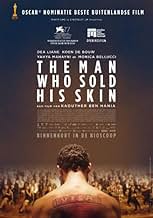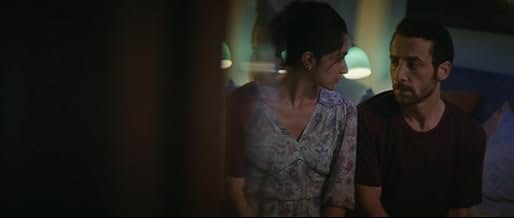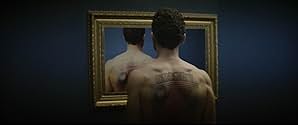AVALIAÇÃO DA IMDb
6,9/10
7,5 mil
SUA AVALIAÇÃO
A viagem de Sam Ali, um sírio que fugiu para o Líbano para escapar da guerra síria, na esperança de se reunir com seu amante em Paris.A viagem de Sam Ali, um sírio que fugiu para o Líbano para escapar da guerra síria, na esperança de se reunir com seu amante em Paris.A viagem de Sam Ali, um sírio que fugiu para o Líbano para escapar da guerra síria, na esperança de se reunir com seu amante em Paris.
- Indicado a 1 Oscar
- 9 vitórias e 12 indicações no total
Koen De Bouw
- Jeffrey Godefroi
- (as Koen de Bouw)
Avaliações em destaque
A desperate man on the run from Syria, sells his back as a canvas for an eccentric artist. He sits as a display for audiences at galleries and museums. His girlfriend Has moved to Belgium with her new husband. He is well paid but has doubts about his choice. The story uses a real life situation where a man sold his skin to an artist. The movie was nominated for an Oscar and I rank it just below A Better Life in the foreign film category.
The opening scene shows a framed item being hung in a stark white exhibition space. We're then greeted to the sound of purring cat as a man stirs awake. This is, for the most part, the nearest we get to a happy scene: 'The man who sold his skin' is an excellent film, but it's not a particularly pleasant story being told.
There is an unyielding tension pervading the feature that comes from the mere knowledge of the premise, let alone seeing the narrative play out. Passing moments of levity, and the quality of the film-making craft on display, help to offset that feeling, and an accompanying melancholy, but don't truly make this easier to watch.
Yet make no mistake, 'The man who sold his skin' is a fine film, very well made. Writer-director Kaouther Ben Hania's camerawork is exquisite, with many eye-catching shots as worthy of appreciation as any piece of art in a museum. There are several instances where lens flare, or the refraction of light through glass, is used to partly obscure a shot with an artistic touch that I think often gets lost in many pictures employing the same tricks. Then, too, the music of composer Amine Bouhafa catches our attention to, perfectly complementing the scenes we see.
And the cast is outstanding. The only actor here I distinctly recognize is Monica Bellucci, whose presence is surprising but welcome, as she brings an entrancing, understated intensity to her role. I could swear I've seen Koen De Bouw in other features, though a glance at his credits suggests otherwise. Still, there's a purposefulness, and cunning, in his countenance that we can't tear our eyes away from. Above all, though, I would love to learn more about Dea Liane, and star Yahya Mahayni, whose lack of renown belies great skill. It's a joy to see them at play, and I'd love to watch more of their features.
Engrossing as Ben Hania's screenplay is, the narrative is a thinly veiled vehicle for stark themes of human rights, racism, exploitation, dehumanization, and the tricks we fool ourselves into believing in pursuit of a better life. There are some especially ugly and cringe-worthy moments on display as these notions are laid as bare as the skin on protagonist Sam Ali's back. Once more - it's undeniably captivating, but viewers looking for an uplifting flick may wish to look elsewhere.
Still, when all is said and done, the ending is a little bit shocking, yet also deeply rewarding. It's a fine capstone to a film that has explored some very murky territory, and further credit to the writing.
There's no question in my mind that 'The man who sold his skin' is well deserving of every accolade to come its way. It can be a difficult movie to watch at times, but it's so well made that it's a journey very much worth taking, and finding to watch wherever you can.
There is an unyielding tension pervading the feature that comes from the mere knowledge of the premise, let alone seeing the narrative play out. Passing moments of levity, and the quality of the film-making craft on display, help to offset that feeling, and an accompanying melancholy, but don't truly make this easier to watch.
Yet make no mistake, 'The man who sold his skin' is a fine film, very well made. Writer-director Kaouther Ben Hania's camerawork is exquisite, with many eye-catching shots as worthy of appreciation as any piece of art in a museum. There are several instances where lens flare, or the refraction of light through glass, is used to partly obscure a shot with an artistic touch that I think often gets lost in many pictures employing the same tricks. Then, too, the music of composer Amine Bouhafa catches our attention to, perfectly complementing the scenes we see.
And the cast is outstanding. The only actor here I distinctly recognize is Monica Bellucci, whose presence is surprising but welcome, as she brings an entrancing, understated intensity to her role. I could swear I've seen Koen De Bouw in other features, though a glance at his credits suggests otherwise. Still, there's a purposefulness, and cunning, in his countenance that we can't tear our eyes away from. Above all, though, I would love to learn more about Dea Liane, and star Yahya Mahayni, whose lack of renown belies great skill. It's a joy to see them at play, and I'd love to watch more of their features.
Engrossing as Ben Hania's screenplay is, the narrative is a thinly veiled vehicle for stark themes of human rights, racism, exploitation, dehumanization, and the tricks we fool ourselves into believing in pursuit of a better life. There are some especially ugly and cringe-worthy moments on display as these notions are laid as bare as the skin on protagonist Sam Ali's back. Once more - it's undeniably captivating, but viewers looking for an uplifting flick may wish to look elsewhere.
Still, when all is said and done, the ending is a little bit shocking, yet also deeply rewarding. It's a fine capstone to a film that has explored some very murky territory, and further credit to the writing.
There's no question in my mind that 'The man who sold his skin' is well deserving of every accolade to come its way. It can be a difficult movie to watch at times, but it's so well made that it's a journey very much worth taking, and finding to watch wherever you can.
"The Man Who Sold His Skin" is a visually stunning and thought-provoking film that delves into the themes of identity, personal sacrifice, and the commodification of human life. Through its exploration of the contemporary art world, it raises thought-provoking questions about the boundaries between art and exploitation. With exceptional performances, particularly from Yahya Mahayni as the protagonist, and exquisite cinematography that captures the juxtaposition of beauty and brutality, this film leaves a lasting impact on viewers. It is a captivating and memorable cinematic experience that skillfully combines social commentary, romance, and dark humor to create a unique and thought-provoking narrative. As the story unfolds, the film prompts reflection on the power dynamics at play in society and the sacrifices individuals make for personal freedom. "The Man Who Sold His Skin" is a true standout in its ability to engage, provoke, and resonate long after the credits roll.
The Man Who Sold His Skin is a pretty good movie. And it's one about art that to an extent shares my feelings and opinions of it. Meaning, that I was naturally inclined to like it as soon as I understood what was going on... And I did.
But the movie comes with its own collection of flaws that are a little too big to miss. The greatest complaint I have is that the movie overall seemed aimless. Aimless in that there was no one destination the writers felt comfortable diving deep into. Rather, the movie keeps itself safe on the surface; often finding itself at the door of a sophisticated and thought provoking conflict, but hesitates entering or engaging with those questions. Another minor complaint is the ending; which after all what the movie has been about, felt a little too cheesy.
Overall, I like what the movie is about, and I'm glad I watched it. The complaints I have are not too great to prevent one from enjoying the movie.
But the movie comes with its own collection of flaws that are a little too big to miss. The greatest complaint I have is that the movie overall seemed aimless. Aimless in that there was no one destination the writers felt comfortable diving deep into. Rather, the movie keeps itself safe on the surface; often finding itself at the door of a sophisticated and thought provoking conflict, but hesitates entering or engaging with those questions. Another minor complaint is the ending; which after all what the movie has been about, felt a little too cheesy.
Overall, I like what the movie is about, and I'm glad I watched it. The complaints I have are not too great to prevent one from enjoying the movie.
Let's just keep in mind that this movie isn't the type of a satirical work that is meant to tackle its subject matter by probing it or offering a deeper understanding of the whole situation and, definitely, not to reach a resolution. It's rather more akin to a cautionary tale, or one that shines a spotlight on the social and political situations and what they entail, exposing the superficiality of them all by explicitly reflecting it on a seemingly unrelated surface, which is here art. Excuse my ignorance of the term that would spare me all that rambling. I just wanted to remind some people (myself included) who can easily mistake this for being too on-the-nose that it's actually intentionally so, the thing that could be clearly noticed through its self-awareness of its pretentiousness, and I couldn't imagine a more competent way to mirror that than espousing art.
The Man Who Sold His Skin revolves around a highly provocative subject of a Syrian refugee, Sam Ali, in Beirut who accepts a deal offered to him by a contemporary artist, Jeffrey Godefroi, to have his back turned into a living work of art in order to travel to Belgium. As a contemporary take on a Faustian deal, the movie truly shines. It's true this story is about a man who sells his skin (hence his identity) to the artist, Jeffrey, (he even mentioned that he sees himself as Mephistopheles) in return for "freedom," but here the protagonist is marked by a pronounced stigma, namely the Visa tattooed on his back, "this work of art bears the signature of the devil," said Mr. Waltz and his wife justifying the reason why they bought Sam. He became a flesh-and-blood example of the exploitation Syrian refugees, although he willingly became one, mainly to live with the love of his life, Abeer. That leads us to the main complaint I have with this movie: the love story, or rather the drama surrounds it.
The movie quickly makes us abandon any thought the story would be heavy on its prickly themes of human trafficking, exploitation and the commodification of people, declaring out loud it's a love story through and through. But here is the thing, the romantic dramedy elements here are too pedestrian and the characterizations severely lacking in nuance to keep me invested. Consequently, the movie drags quite often. The story also tries to stir a few emotional chords by the end, trying as hard as it can to bring out more of its potential to be a reflective drama. Suffice it to say, it falls flat on the emotional punch. What really bogged this movie down is its dense caustic encapsulation, which although it lends the social commentary the edge it needed, it definitely does seem completely discordant with both the dramatic and the romantic aspects, hindering the heart and levity from seeping out of the surface.
As art takes the centre stage, the cinematography doesn't skimp on its artistic ambitions. First movie that popped into my head watching the stunning, garish visuals in the scenes set in the gallery is Velvet Buzzsaw (Dan Gilroy's latest effort, also centred around art,) but instead of only serving its sole purpose of giving a hazardous sense, here it surpasses that by expressing the inner feelings of the characters. The compositions, in particular, that involved two or more characters resulted in some of the best shots I've seen in any movie from last year; they are truly eloquent when it comes to juxtaposing the characters' emotions and thoughts.
(6/10)
The Man Who Sold His Skin revolves around a highly provocative subject of a Syrian refugee, Sam Ali, in Beirut who accepts a deal offered to him by a contemporary artist, Jeffrey Godefroi, to have his back turned into a living work of art in order to travel to Belgium. As a contemporary take on a Faustian deal, the movie truly shines. It's true this story is about a man who sells his skin (hence his identity) to the artist, Jeffrey, (he even mentioned that he sees himself as Mephistopheles) in return for "freedom," but here the protagonist is marked by a pronounced stigma, namely the Visa tattooed on his back, "this work of art bears the signature of the devil," said Mr. Waltz and his wife justifying the reason why they bought Sam. He became a flesh-and-blood example of the exploitation Syrian refugees, although he willingly became one, mainly to live with the love of his life, Abeer. That leads us to the main complaint I have with this movie: the love story, or rather the drama surrounds it.
The movie quickly makes us abandon any thought the story would be heavy on its prickly themes of human trafficking, exploitation and the commodification of people, declaring out loud it's a love story through and through. But here is the thing, the romantic dramedy elements here are too pedestrian and the characterizations severely lacking in nuance to keep me invested. Consequently, the movie drags quite often. The story also tries to stir a few emotional chords by the end, trying as hard as it can to bring out more of its potential to be a reflective drama. Suffice it to say, it falls flat on the emotional punch. What really bogged this movie down is its dense caustic encapsulation, which although it lends the social commentary the edge it needed, it definitely does seem completely discordant with both the dramatic and the romantic aspects, hindering the heart and levity from seeping out of the surface.
As art takes the centre stage, the cinematography doesn't skimp on its artistic ambitions. First movie that popped into my head watching the stunning, garish visuals in the scenes set in the gallery is Velvet Buzzsaw (Dan Gilroy's latest effort, also centred around art,) but instead of only serving its sole purpose of giving a hazardous sense, here it surpasses that by expressing the inner feelings of the characters. The compositions, in particular, that involved two or more characters resulted in some of the best shots I've seen in any movie from last year; they are truly eloquent when it comes to juxtaposing the characters' emotions and thoughts.
(6/10)
Você sabia?
- CuriosidadesWhile director Kaouther Ben Hania was visiting the Louvre Museum in Paris in 2012, there was a retrospective of Belgian artist Wim Delvoye. There she saw, in Napoleon III's apartments, Delvoye's Tim (2006 - 08), in which the artist had tattooed the back of Tim Steiner, who was sitting on an armchair with his shirt off displaying Delvoye's design. The piece was sold to a German art collector and Tim is contractually obliged to spend a certain amount of time, topless and sitting still, in a gallery every year. Wim Delvoye appears in the movie as the insurance guy.
- Erros de gravaçãoWhen Sam Ali changes his seat at the train at 05:55, the place of the man in the back seat changes each time the camera switches between Sam and Abeer.
- ConexõesFeatured in A 93ª edição do Oscar (2021)
- Trilhas sonorasFiliae maestae Jerusalem, RV 638: I, 'Filiae maestae Jerusalem'
Music by Antonio Vivaldi (uncredited)
Conducted and Performed by Philippe Jaroussky (Audio) (p)
Performed by Ensemble Artaserse (uncredited)
2014 Erato/Warner Classics, Warner Music UK Ltd.
Principais escolhas
Faça login para avaliar e ver a lista de recomendações personalizadas
- How long is The Man Who Sold His Skin?Fornecido pela Alexa
Detalhes
- Data de lançamento
- Países de origem
- Centrais de atendimento oficiais
- Idiomas
- Também conhecido como
- The Man Who Sold His Skin
- Locações de filme
- Empresas de produção
- Consulte mais créditos da empresa na IMDbPro
Bilheteria
- Orçamento
- € 2.230.000 (estimativa)
- Faturamento bruto mundial
- US$ 227.290
- Tempo de duração1 hora 44 minutos
- Cor
- Mixagem de som
- Proporção
- 2.39 : 1
Contribua para esta página
Sugerir uma alteração ou adicionar conteúdo ausente

Principal brecha
What is the Hindi language plot outline for O Homem que Vendeu sua Pele (2020)?
Responda




























